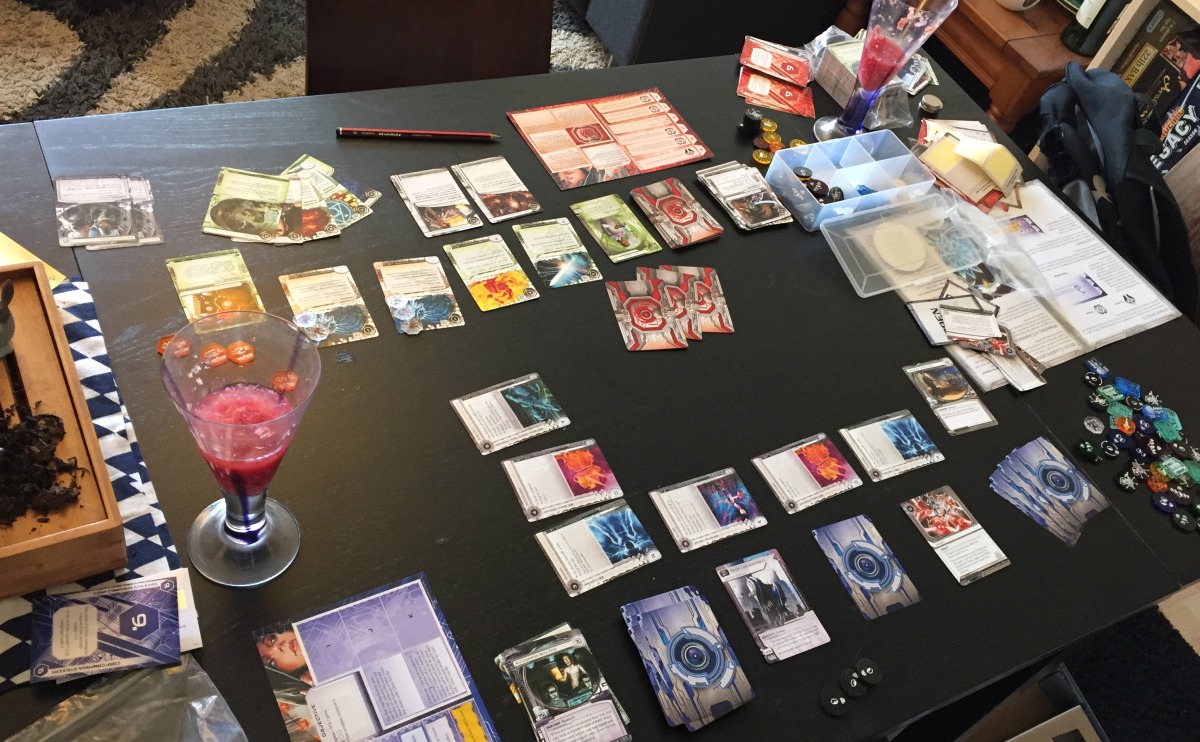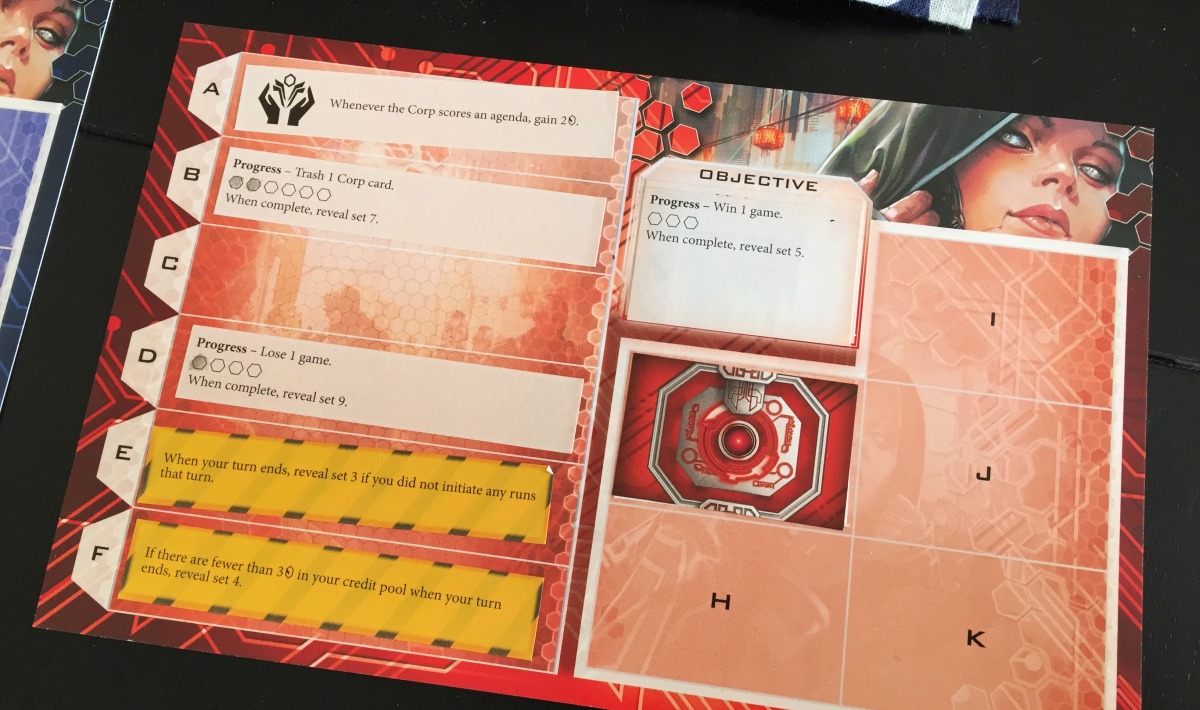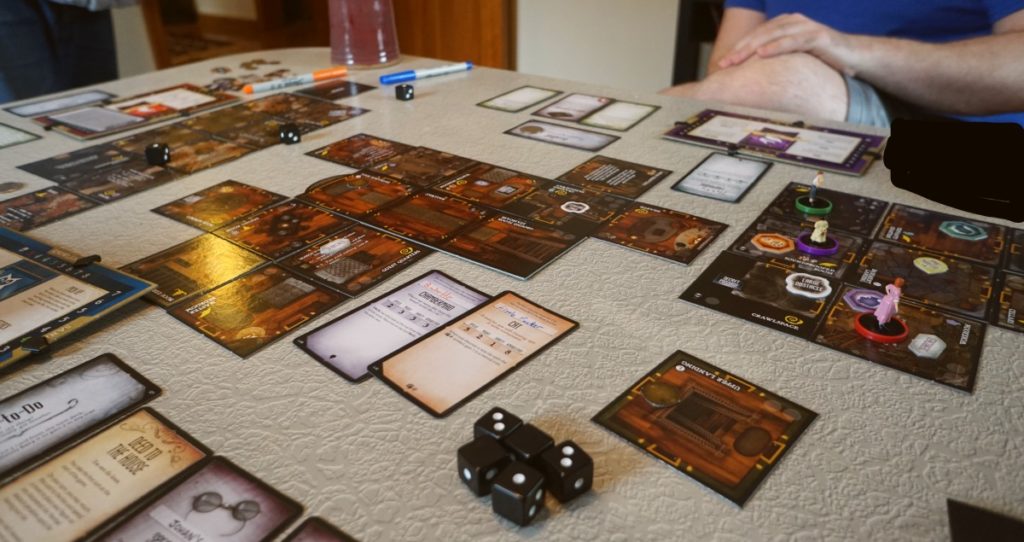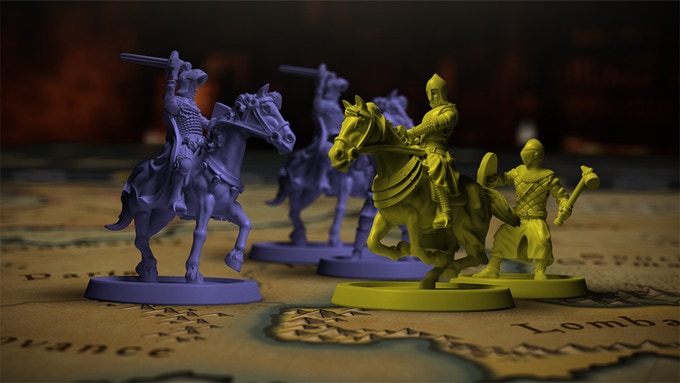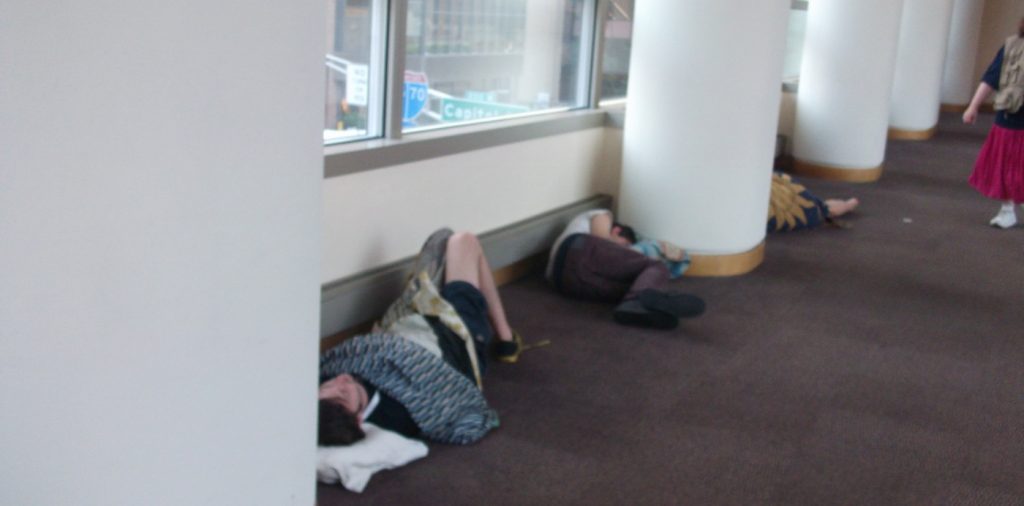Quinns: Oof, reviews don’t get much tougher than this.
I’ve just finished playing an advance copy of Terminal Directive, the most dramatic expansion that Android: Netrunner has ever received. This big box introduces not just a campaign to the superlative cyberpunk card game, but the dramatic “Legacy” elements that you might remember from Pandemic: Legacy. As the story unfolds players open new packs of cards, but also destroy cards and cover them with stickers.
Best of all, Terminal Directive is a long-awaited stepping stone for new Netrunner players! Previously if you bought the core set and liked it, you then faced the intimidating proposition of simply starting to buy up Netrunner’s forty-two expansion packs. Now you can buy the core set, and then enjoy Terminal Directive’s campaign, and then – erm – begin buying forty-two expansion packs.
There’s just one problem. After being a zealous advocate for this game for years on end, today I don’t play Netrunner anymore. Let’s talk about why.
So, let’s be clear: Netrunner took over my life.
What started with my review of the phenomenal base game quickly turned into an obsession. I started going to meet-ups here in London to test my decks with strangers. I started attending tournaments. I started organising tournaments. I taught my wife the game, and we wrote a feature about it. I did well in the 2015 UK Netrunner nationals, and Leigh and I wrote a heartfelt feature about that too. Fantasy Flight would later get in touch with Leigh and she’d write a novella set in the Android universe.
Even more ridiculously, Leigh and I ended up making some very close friends from the Netrunner scene who we still see every week. My friend Tim would go on to win the last ever tournament I ran.
That’s him on the right.
The whole thing was a heck of a journey lasting just under three years, and Tim’s convinced me that we should get matching Netrunner credit symbol tattoos to celebrate the whole thing. The games, the love, the friends we made.
But that journey came to an end. In the Spring of 2016, one by one, my closest friends and I stopped attending meet-ups and stopped buying expansions.
Why? Well, the truth might be that humans sometimes just lose interest in their hobbies. But I think there were other factors at play. I found that with every month that passed the competitive game was getting less playful and more stony. I’ve done a lot of thinking about why that was.
One reason was always going to be Netrunner’s ever-swelling card pool. I don’t want to get too technical here, but the reason Netrunner is so good is the foundation designed by Richard Garfield. It’s a deadly game of bluffs, with the Corporation player managing a wealth of secret information and the Runner trying to figure out when and where they should probe those secrets. If you choose right, you can turn the corporation from a cat into a mouse. If you choose wrong? You might be dead. But every turn players are drawing new cards from their deck, as if they were pulling the lever on a tiny slot machine, constantly changing the game state. There is always hope!
But competitive decks don’t want hope, they want certainty, and as Netrunner’s card pool has swelled with cards that are unquestionably mistakes made by the designers, so competitive players have been given the tools they need to bypass so much of the interplay that made Netrunner fun. Delicate systems, like different types of Intrusion Countermeasures that the runner must prep for, or the sanctity of whether a face-down card is something the runner can steal, have become less relevant.
The game might have fared better despite Fantasy Flight’s mistakes if it weren’t for the growth of fan-made internet platforms that let people play Netrunner online. As these have gotten better and better, we get people playing Netrunner faster and faster, where testing some hot new deck is as simple as downloading a file.
When my friends and I started going to meet-ups, everyone in the scene was playing around five games a week, which means the refinement of our decks was a magical, personal process. Today, when you and your friends can test the same deck six or seven times a night, with no tedious sleeving and unsleeving cards, you end up with brutal decks that are more science than art.
As my friend Tim puts it, when we started playing Netrunner we could design a deck and think it might just work. “There is always hope.” By the time we got good, the best decks in the world were in such rapid circulation in our local meets that to play anything else felt silly. We’d get new cards, design a deck on our lunch break… and feel that we’d wasted our time, because the deck wouldn’t stand up to the world’s best. Our prize for getting good at the game was realising that every deck we made wasn’t competitive.
So, in order of damage done, I think an enormous pool of cards is bad for any game. I think internet play was harmful to Netrunner’s long-term ecosystem. But maybe the most crippling thing for our enjoyment of the game was that we became good players, which felt like a one-way door. We couldn’t go back to playing amateur decks, but we didn’t enjoy the competitive game, which by the time we left barely resembled the game of Netrunner that we fell in love with.
Actually talking about Terminal Directive now:
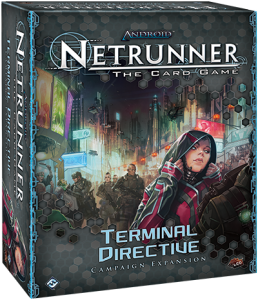
Which brings us to Terminal Directive! A new, deluxe expansion offering (as always) a load of new cards, but also a legacy-style campaign that offers a Netrunner experience from history- to play the campaign, you just add the new cards in this box to the core Netrunner set. In other words, this box is a portal back into old Netrunner. And old Netrunner, as I discovered all over again, is a ton of fun.
So this is going to make for a simple review, right? It’s an inventive expansion to a great old game?
Well, yes and no. Because while original Netrunner is great, Terminal Directive is a very weird box.
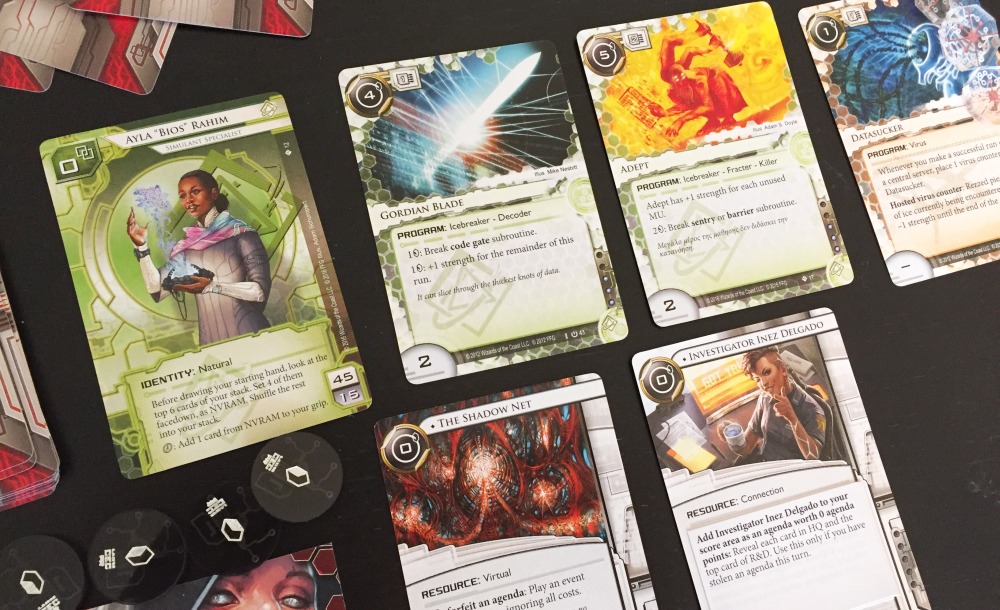
The campaign tells the story of an android that may or may not be wanted for murder, and the runner and corporation are both racing to get to the truth first. Between games, in addition to being able to tweak your deck and occasionally unveil new cards, the two of you will read quite a lot of text that advances the story.
There are just two problems with this, which is that I don’t think it’s written by a professional and it’s not a story about hackers and corporations. Instead, it feels like Fantasy Flight trying to shove their proprietary Android universe into the limelight at the cost of Garfield’s game of Netrunner, a balancing act that Android: Netrunner is usually really good at. Here, every chunk of story you uncover feels like a story bible sneezed on it. There are cards that are so full of brands and acronyms they read more like an index than prose.
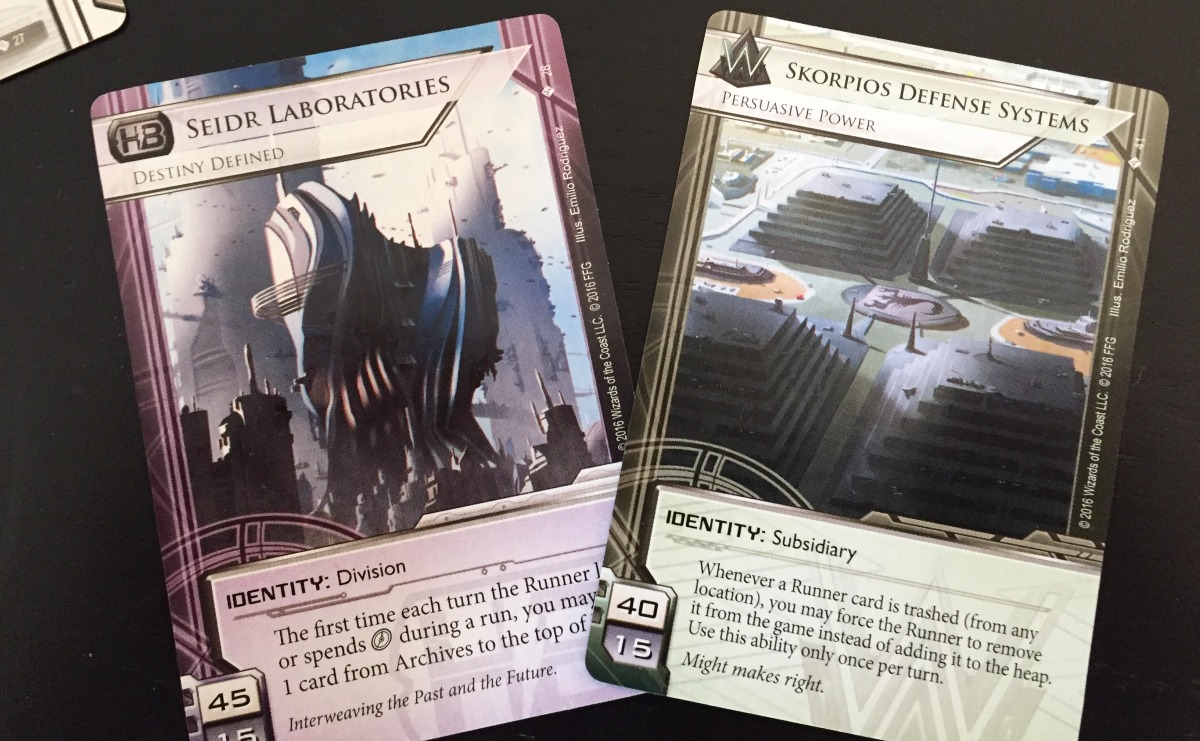
Maybe the biggest reason that the story suffers is due to bizarre decision of how to structure this expansion.
The box includes a finger’s width of new cards for two corp factions (pictured above) and two runner factions, and the campaign begins with the two players choosing either runner or corp, and then picking their faction.
This means that the unchosen corporation and runner aren’t used at all in the campaign. So not only do new players who buy Terminal Directive for the campaign not use more than 50% of the included cards, the story never refers to the actual corp or hacker you picked, giving the writing a porridgy tone that could refer to anybody.
Why didn’t Fantasy Flight release two legacy campaigns in smaller boxes, each featuring one runner and one corp, and release them separately? Each would have featured a more personal story, and they could balance the campaign better, and players could choose what campaign to buy based on what faction they’d like to start collecting, and save a little money. Or buy both and spend more money than the RRP of Terminal Directive.
On the subject, Terminal Directive’s packaging is equally bizarre. The below photo isn’t a totally fair representation since it’s missing Terminal Directive’s manual and a ton of sticker sheets, but it should illustrate what I’m talking about. What a waste of cardboard!
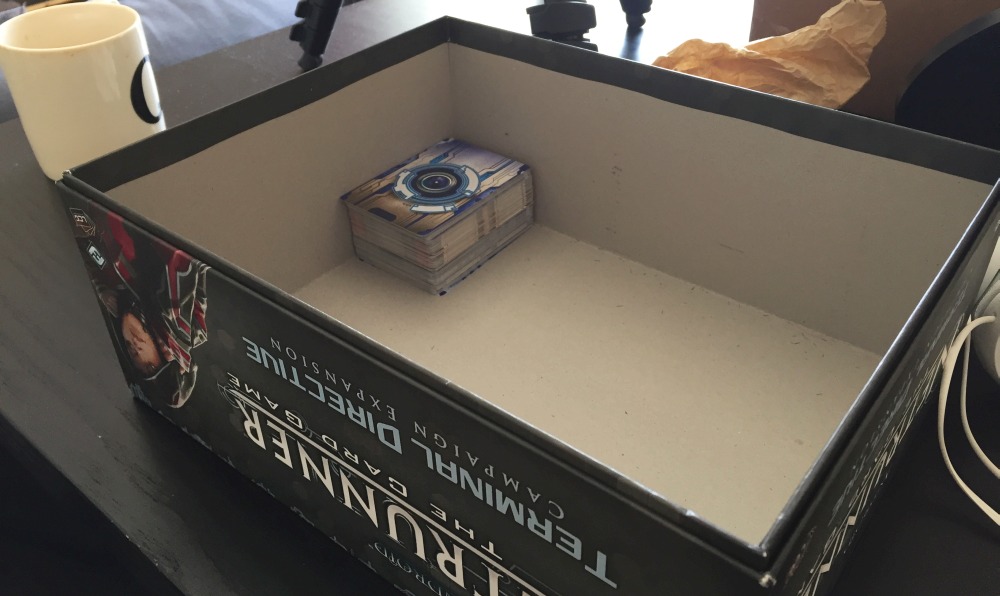
Another feature that’s very hit and miss is each player’s “PAD”, which you can see below. These gets covered in stickers throughout the campaign, revealing your objective and, intriguingly, stuff you don’t want to achieve. Fine.
But the PAD also steadily gets filled up with all sorts of awkward triggers, for example giving the runner 2 credits each time the corporation scores an agenda. These are neither entertaining nor boring, but they do give new players (who this box is aimed at, let’s not forget) the task of remembering a whole load of extra stuff that only sometimes improves the game. It’s as if someone at Fantasy Flight decided that this box should definitely include stickers, heedless of whether the game benefited.
In all honesty, almost every hour I spent with Terminal Directive of the nine or so hours it took us to finish the campaign (though you can probably double that time if you’re new to Netrunner) gave me new insight into ways it didn’t fulfill its potential. You could do so much with a Legacy box for a collectable card game. You could tell such a rich story and introduce crazy new mechanics, and despite the ludicrously deep box, the design itself feels more like a paddling pool.
So, what’s my conclusion?
Oh, that’s simple. Ignore all of my complaining. Anyone who’s interested in this box should buy it in a heartbeat.
I can complain about the minutiae of the design all I want. What did you expect from a curmudgeonly ex-Netrunner? Terminal Directive might be mediocre, but it’s still Netrunner and it’s still an absolutely great idea for an expansion. I found it entertaining from start to finish. No, it doesn’t live up to its potential, partially because that potential – between Netrunner’s foundation and it being such a great idea – is limitless.
Let’s not lose perspective. This is still worlds more exciting than a normal deluxe expansion for a card game, and it succeeds in being the perfect second step for new players after they’ve decided they want to move on from the core set.
Insanely, I’m actually welling up as I type this because this box let me go home again. Not only did Terminal Directive take me right back to the game of Netrunner that captured my imagination and stole countless dimly-lit evenings, it took me back to a time when I was learning how to play the game.
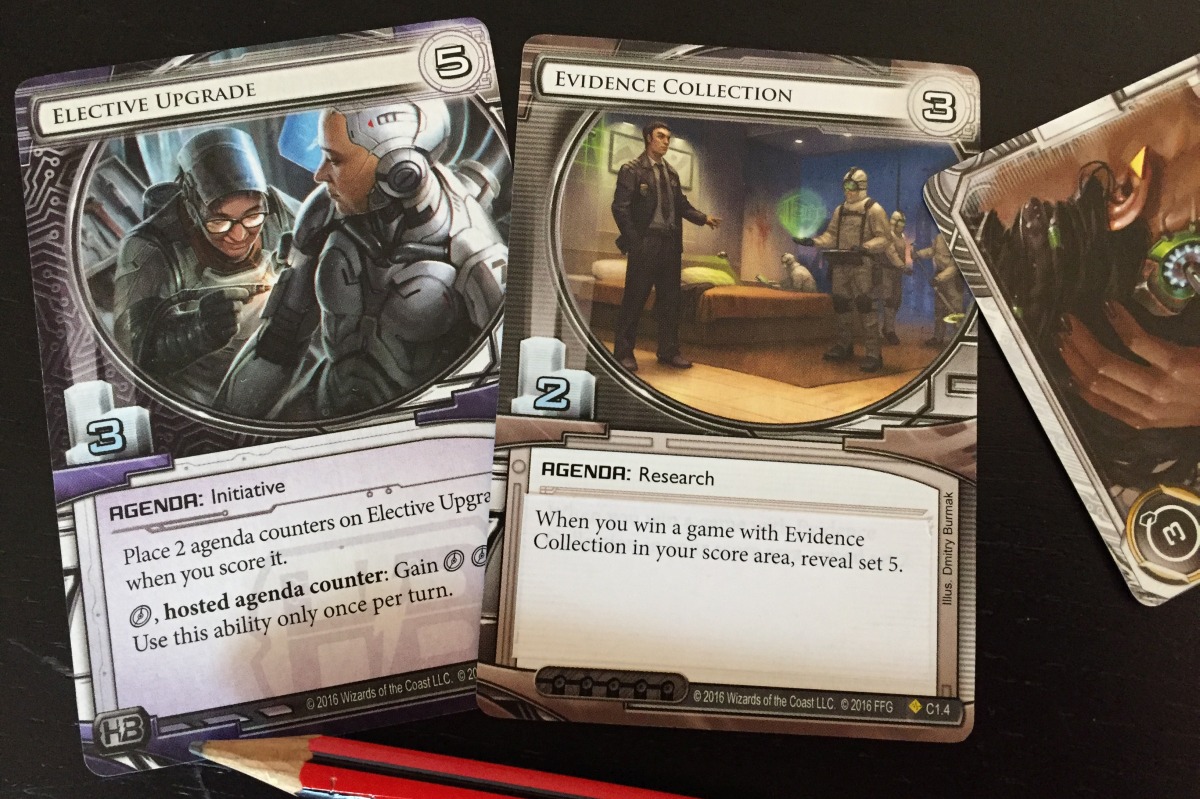
But never mind what this box did for me. It’s an amazing treat for every new player who’s discovering all of these systems for the first time. This box is a brilliant sampler platter of everything Netrunner is if you venture beyond the core set. In a perfectly safe space it introduces you to deckbuilding, and a constant flow of interesting objectives and new cards give the experience a smooth groove.
And of course, unlike a Legacy game, which goes in your bin when you’re finished with it (or gets framed on your wall, depending on your sentimentality), Terminal Directive finally transforms into a doorway to even more fun. Most of the cards you played with become an addition to your collection, and playing so many games with the faction you picked will just make you curious about the ones which aren’t included in this box, like the sexy clone farms of Jinteki or unpredictable Anarchs. If you’re hungry for even more cards, Order & Chaos would probably be the third Netrunner product I’d buy, if I were you.
So that’s my review. Confusing, exciting, emotional, just like my time with Netrunner. If you were expecting me to review the actual cards in the box, that’s not going to happen. This expansion is a celebration of Netrunner at its purest, and that includes delighting at new cards as you unwrap them. I’d hate to spoil any of that.
I wonder when I’ll start playing Netrunner again? I expect it’ll take something wild, like Fantasy Flight rebooting the entire game. But I eagerly await the day that they do that. I sincerely hope that one day you’ll once again find me playing cards at my local meet.

